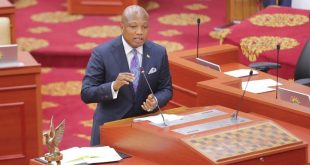
The Minister
The scheme, which is a key intervention by the government, is expected to provide low-to-middle-income earners with a mechanism to pay low monthly rent, which effectively removes the need for rent advance payment and ultimately improves the quality of rental accommodation, especially in urban cities.
The Minister told Parliament on Wednesday, November 8, that the scheme was conceived by the government as a result of the high demand for affordable rental housing.
“It targets formal and informal individuals with regular income. It removes the huge advance payment.
“Since the scheme was launched in January 2023 to October 2023, a total of 1,105 Ghanaians from six operational regions—the Greater Accra, Eastern, Western, Ashanti, Northern, and Bono East regions—have benefited from the scheme. Mr Speaker, GH¢13, 785,591 has been disbursed to cover the rent advance to all the 1105 beneficiaries across the six operational regions.
“Mr Speaker, my ministry will update this house on the operations of the scheme from time to time in the spirit of accountability and transparency,” he stated.
The Vice President, Dr Mahamudu Bawumia launched the scheme. He indicated that the introduction, as enshrined in the government’s 2020 manifesto, was part of measures to reduce the need for huge rent advance payment requests by landlords and ultimately enhance the creditworthiness of potential tenants in their search for residential rental accommodation.
The Vice-President further explained the Scheme would target individuals, both in the formal and informal sectors, with identifiable and regular income, adding that the rent advance loans would be paid directly into the bank accounts of landlords.
“I am aware of the series of engagements that have gone on between key stakeholders on the operationalization of the scheme, and I look forward to the enormous relief that the scheme will bring to its beneficiaries and the good people of Ghana”.
Rental accommodation has been a significant share of shelter services in the country, especially in urban areas, catering for 34.6% of households, out of which 46% are in urban areas and 17.1% are in rural areas. Research further reveals that only 5% of Ghana’s population can acquire their own homes without any form of assistance, with 60% requiring support that is facilitated by the state to access housing, while 35% will require additional direct support before they can have access to housing.
With potential beneficiaries needing the Ghana Card as one of the prerequisite requirements to access the scheme, the Vice President said the criteria did not only support the call to synchronize all platforms with the National Identification System but also that “the data produced from the implementation of the scheme will facilitate government efforts at expanding our revenue stream through the improved collection of rent tax.”
 Uniquenewsgh.com News, Politics, African News Updates & More
Uniquenewsgh.com News, Politics, African News Updates & More



